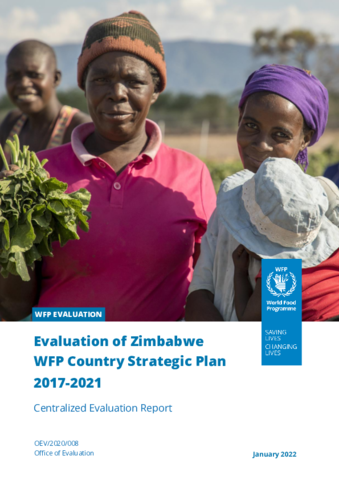
The evaluation was commissioned by the independent Office of Evaluation to provide evaluative evidence for accountability and learning to inform the design of the next WFP CSP in Zimbabwe. It covers WFP activities implemented between 2015 and 2020 to assess continuity from the previous programme cycle, the extent to which the CSP introduced strategic shifts and implications for such shifts for performance and results.
It was conducted between September 2020 and May 2021 to assess WFP’s strategic positioning and role and the extent to which WFP has made the strategic shift expected by the CSP; WFP’s contributions to strategic outcomes; efficiency and factors that explain WFP performance.
The evaluation concluded that:
- The planned shift to a more developmental role for WFP had to be readjusted after a series of climatic and economic shocks and the onset of COVID-19. The Country Office adapted rapidly
and responded effectively to the deteriorating food security situation and the emergence of COVID-19. - The CSP constituted an important step forward from previous collections of fragmented programme documents creating conceptual links between humanitarian and development work. However, the approach did not automatically create stronger operational linkages because the assignment of activities to crisis response, resilience building and root causes categories created a set of siloes.
Although the total funding increased so did earmarking and flexibility to use funding was not improved. - Success in delivering against the ambitious goals of the CSP increasingly required WFP to collaborate and to draw on external expertise, particularly in the CSP areas of resilience and response to root causes.
- Adequate monitoring and evaluation systems were not yet in place, jeopardizing the organization’s reputation and compromising its ability to learn from performance.
- The CSP did not enable WFP to become more effective in achieving its gender equality and women’s empowerment goals.
- The long-term goal of supporting national ownership remains important and valid. However, there are important questions regarding how to achieve change at a realistic pace
